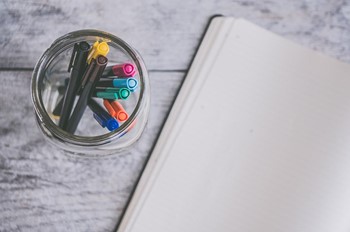Sometimes, all we need is a bit of time for ourselves, which is why writing is such an enjoyable way to grow as a person. Whether you’re a student, a stay-at-home parent, or a teacher, there is undoubtedly room for personal development in your life.
However, picking up writing as a tool for personal development takes some persistence, and healthy habits are often difficult to adjust to. How exactly can you benefit from journaling and writing as a means to develop as a person? What tools do you need to do that, and how long will the process take? Let’s find out together.
Benefits of Using Writing for Personal Development
Before we talk about how you can use writing to develop, let’s talk about some facts about its benefits. According to medical research, writing can alleviate our worries and help us overcome traumatic events as well as improve mental health.
We are all emotional beings with wants and needs. Sometimes, these are difficult to express in words to another person. Writing things down and thinking about how we can use them to better ourselves is an old but effective technique for personal development. As such, it can bring about several important benefits to you going forward:
● Help you put your life into perspective and be thankful for the good things you have
● Improve your memorization and cognitive abilities as a result of continuous writing
● Boost your immune system functions and reduce depression, stress, or anxiety
● Improvement in expressing your thoughts and feelings to others around you
1. Set Achievable Goals for Yourself
You should be ambitious in the goals you set out for yourself but also objective about them. While many of us would like to go to space one day, it is not a very realistic goal. Instead, you can pick up a great personal development methodology such as SMART and use it to your advantage.
SMART will allow you to set up several attainable goals, which you will be able to write about and tick off in your notebook. This is a far better strategy than writing down unrealistic or abstract goals, which can often be forgotten on the pages of your journal.
2. Keep a Notebook Close-By
A simple yet trusty notebook is all you need to make good use of writing for personal development. You can go about the process in several ways depending on your personality and whether you have anxiety, ADHD, or other attention disorders. Some methods you should try out for personal development in writing include:
● Doodling, sketching, and drawing
● Mind mapping
● Daily journaling
● Setting and tracking goals with small comments
● Bullet journaling
While you’re at it, your notebook must be within reach at any moment. Keep it safely in your backpack, next to your bed, or in a visible spot at home. While it may take some time to get into the habit of writing, it will slowly become second nature to you.
3. Use Colorful Pens and Markers to Write
No matter how old you are, the psychology of color plays a huge role in how you memorize things. Using different colors to write different things in your notebook to categorize them or make them more vibrant is an amazing idea.
Grab a few colorful pens or markers and start jotting down notes about what you did that day and how it made you feel. You can also use colors to keep a mood journal and get a better idea of how your emotions shift daily. Don’t write a monotonous journal with a standard graphite pen – get creative and start using different colors.
4. Help Your Writing Process with Online Resources
While you may do the majority of your writing by hand, you may find yourself outside and want to take notes on your phone. There is an abundance of online resources which can help improve your writing and make it easier to write for personal development.
Tools such as Evernote are designed for taking notes, while Canva can help you sketch your notes instead and turn them into visuals. Keep a professional news article writing service handy in case you want to clean up your grammar and format the writing more thoroughly. Don’t limit yourself to traditional text editors when taking digital notes, and the writing process will become that much more engaging.
5. Reflect on Where you Started Compared to Now
Reflecting on how your journey has progressed is an essential part of the process. Make it a habit to go through your past writing once a month and compare it to your current train of thought. Which skills have you developed in the meantime? How many new people have you met since? What about your handwriting, tone of voice, and style of writing in general?
Comparing your current self to past selves is an amazing way to see the progress you’ve made. If you feel inclined to do so, you can also share this part of the process with a close friend or a family member. Someone who knows you well will be able to give you a good insight into how to move forward with writing for personal development.
Personal Development as a Lifestyle Choice (Conclusion)
The answer to the question of “when” the process of personal development is finished is an obvious one – it never really ends. There is a good reason as to why the famous Renaissance painter Michelangelo’s last words were “I am still learning”.
We learn as long as we are alive, and this goes double when it comes to personal development. Day in and day out, we become better versions of ourselves. Through writing, you can improve that process and direct your development as you see fit. Best of all, you will start to notice changes in your behavior, lifestyle, and daily routine thanks to writing – start your personal growth today.
 Author bio: Jessica Fender is a professional writer and educational blogger at GetGoodGrade, an aggregator for useful college resources and websites. Jessica enjoys sharing her ideas to make writing and learning fun.
Author bio: Jessica Fender is a professional writer and educational blogger at GetGoodGrade, an aggregator for useful college resources and websites. Jessica enjoys sharing her ideas to make writing and learning fun.





Leave Comment